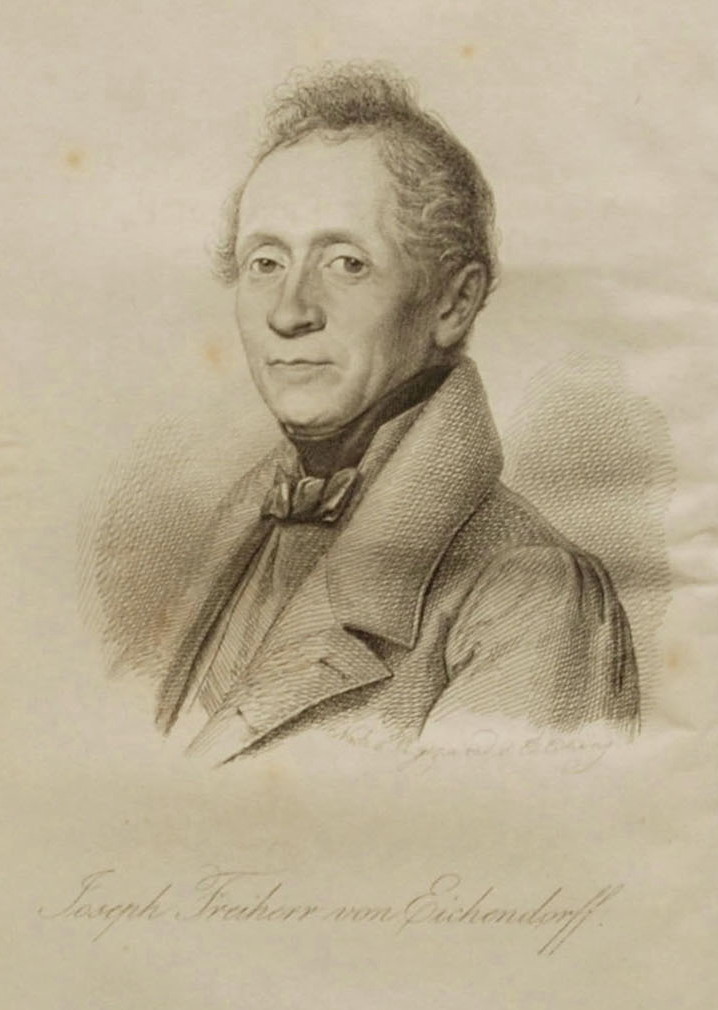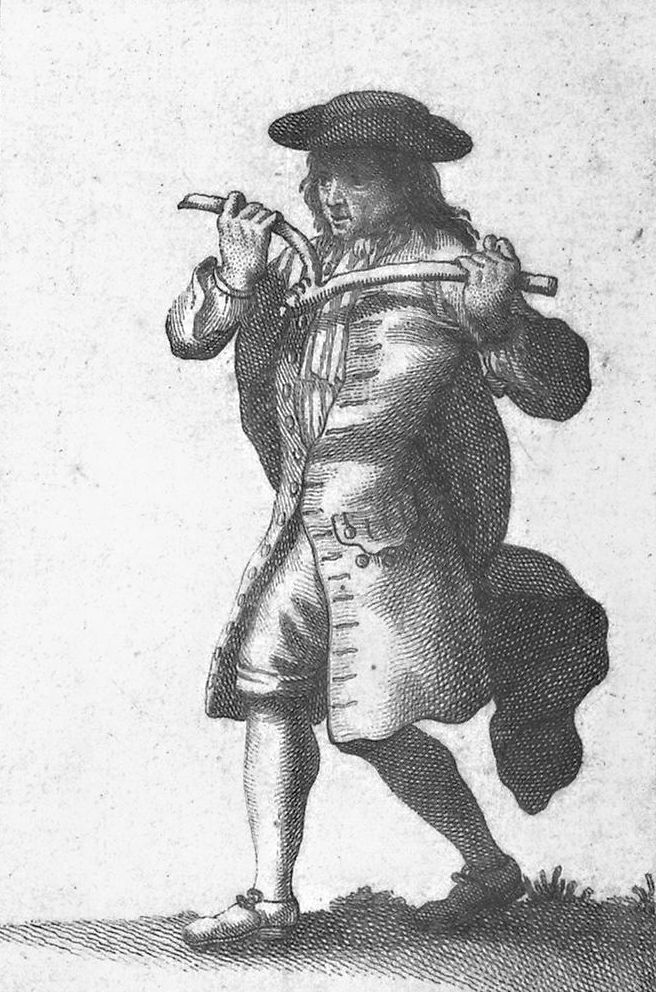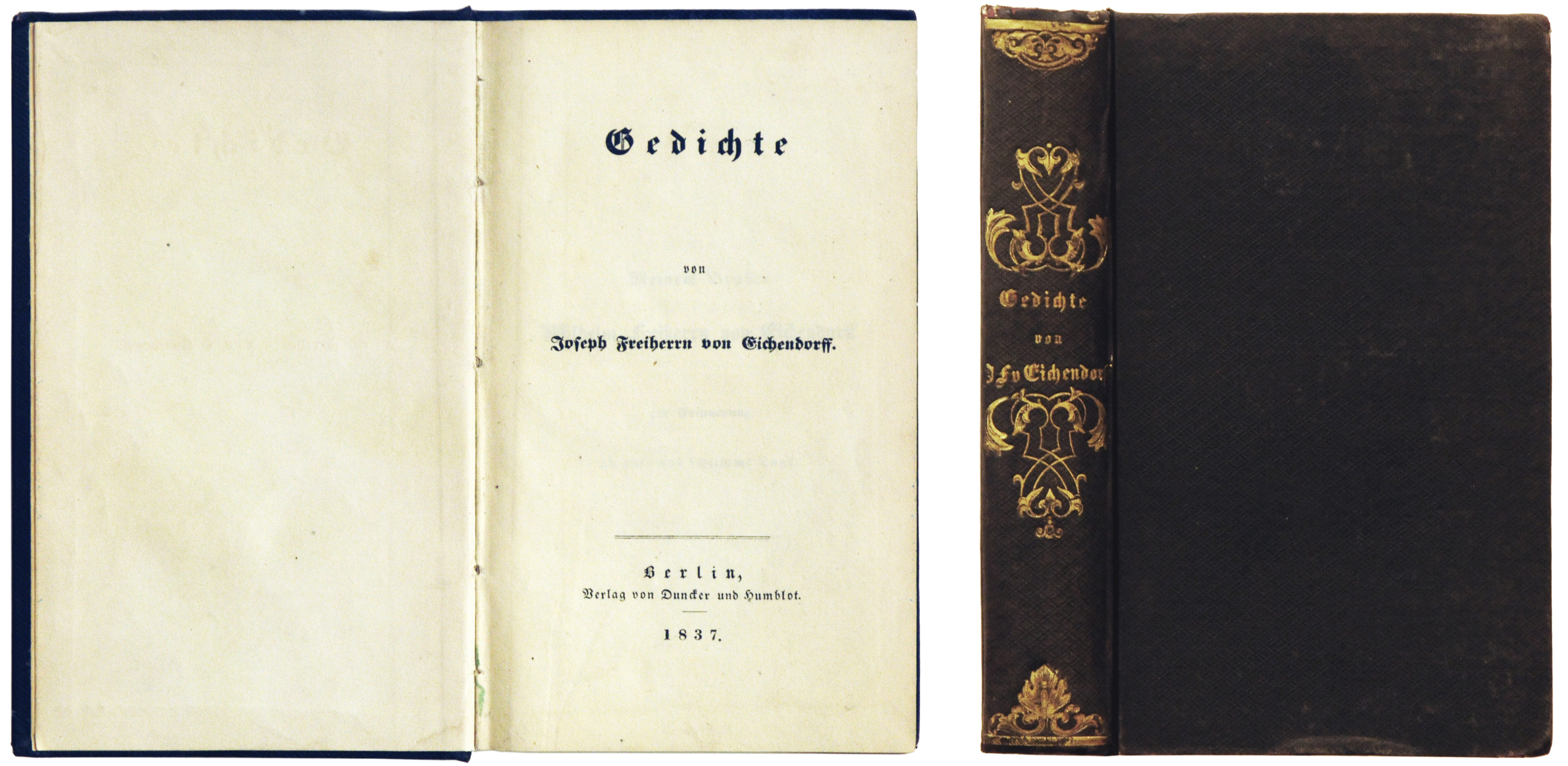Wünschelrute on:
[Wikipedia]
[Google]
[Amazon]




 Wünschelrute (
Wünschelrute (
Wünschelrute
Schläft ein Lied in allen Dingen,
die da träumen fort und fort
und die Welt hebt an zu singen,
triffst du nur das Zauberwort.
Wishing-Wand
A song sleeps in all things around
Which dream on and on unheard,
And the world begins to resound,
If you hit the magic word.
''Translated by Natias Neutert''

Eichendorff: Wünschelruthe
1838; i
Projekt Lyriktheorie
Weiterreichende Überlegungen und Materialien zur Gedichtanalyse von norberto42




 Wünschelrute (
Wünschelrute (dowsing rod
Dowsing is a type of divination employed in attempts to locate ground water, buried metals or ores, gemstones, oil, claimed radiations (radiesthesia),As translated from one preface of the Kassel experiments, "roughly 10,000 active dowsers in Ge ...
) is one of the most famous poems by Joseph Freiherr von Eichendorff, major poet of the German ''Hochromantik'' ("High Romantics").
Source text and its translation
Versification
Literary-historical classifications
Timeframe
It was written 1835, probably in Berlin, and published 1838 im Deutschen Musenalmanach.Titling
The word component ''Wünschel'' is a typic Silesian diminutive form of the German noun ''Wunsch'' (wish). The other combining word component is -''Rute'' (rod). The connotation of ''Wünschelrute'' corresponds perfectly with the inner motif of longing throughout his work, as Natias Neutert points out. insofar „some kind of watermarking of his poetry flow“.Imaginable stimulus
Whether Eichendorff knew it or not, is not assured: «Wünschelrut''h''e» (written in the way of those days—with an ‚h’) was the name of a literary magazine with the subtitle ''Ein Zeitblatt'' (A Time Sheet), published twice weekly from January to June 1818 inGöttingen
Göttingen (, , ; nds, Chöttingen) is a college town, university city in Lower Saxony, central Germany, the Capital (political), capital of Göttingen (district), the eponymous district. The River Leine runs through it. At the end of 2019, t ...
in the times of High Romantics. Edited in the name of a student poet circle, named «Poetische Schusterinnung an der Leine
The Leine (; Old Saxon ''Lagina'') is a river in Thuringia and Lower Saxony, Germany. It is a left tributary of the Aller and the Weser and is long.
The river's source is located close to the town of Leinefelde in Thuringia. About downriver, t ...
» by Heinrich Straube (1794-1847) and Johann Peter von Horn Thal (1794-1864), son of the mayor of Bamberg
Bamberg (, , ; East Franconian: ''Bambärch'') is a town in Upper Franconia, Germany, on the river Regnitz close to its confluence with the river Main. The town dates back to the 9th century, when its name was derived from the nearby ' castle. C ...
.
Other contributors were Achim von Arnim (1781-1831), Clemens Brentano
Clemens Wenzeslaus Brentano (also Klemens; pseudonym: Clemens Maria Brentano ; ; 9 September 1778 – 28 July 1842) was a German poet and novelist, and a major figure of German Romanticism. He was the uncle, via his brother Christian, of Franz a ...
(1778-1842), Brothers Grimm
The Brothers Grimm ( or ), Jacob (1785–1863) and Wilhelm (1786–1859), were a brother duo of German academics, philologists, cultural researchers, lexicographers, and authors who together collected and published folklore. They are among the ...
, Jacob (1785–1863) and Wilhelm Grimm (1786–1859), Ernst Moritz Arndt 1769–1860, and some professors and students of the local university. The magazine contained mainly literary texts, poems and stories, and announcements about the literary scene. Focussed on folk song and saga.
It might well be that Eichendorff read it.
Real object, poetical subject
The namegiver of Eichendorff’s poem is the wooden dowsing rod, an instrument used to locate ground water, oil, buried metals or ores, gemstones and many other objects and materials without the use of scientific apparatus. Dowsing is also seen as divining; especially in reference to interpretation of results. Eichendorff used the real ''Wünschelrute'' as a metaphor for the faculty of imagination and the "witchcraft" or "magic powers" of poetry. The poet’s relationship to nature is such as those of a singer who has to seek for the hitting word to strike the right note, as Günther Schiwy, holder of the Eichendorff-Medal, characterized it. Neutert marked the poem, by analogy to the magnetic field intensity, as a creation full of „magic field intensity.“Cf. Natias Neutert: ''Foolnotes''. Smith Gallery Booklet, Soho New York 1980, p. 7.Set in music
Thomas Schubert: ''Wünschelrute'', in: ''Schläft ein Lied in allen Dingen — Drei Eichendorff-Lieder für mittlere Stimme und Klavier'',007
The ''James Bond'' series focuses on a fictional British Secret Service agent created in 1953 by writer Ian Fleming, who featured him in twelve novels and two short-story collections. Since Fleming's death in 1964, eight other authors have ...
Laurentis-Musikverlag (LMV), Frankfurt am Main 2008, p. 11.
External links
Eichendorff: Wünschelruthe
1838; i
Projekt Lyriktheorie
Weiterreichende Überlegungen und Materialien zur Gedichtanalyse von norberto42
References
{{DEFAULTSORT:Wunschelrute Romanticism 19th-century German literature 1838 poems Works by Joseph von Eichendorff